Psyllium is a natural, soluble fiber found in the husks of the psyllium (Plantago ovata) seed. It is mainly used as a dietary supplement to alleviate symptoms of constipation, diarrhea, and other digestive issues. It can also be used as a binding agent or thickener in some recipes.
But what if you’re out of these versatile husks? Well, all you need to do is find the right psyllium husk substitute(s) below!
Each psyllium substitute on the list is compared to psyllium in terms of their similarities and differences. I’m sure this will help you find the right substitute for your needs and preferences. So, let’s see!
1. Flaxseed

Flaxseed comes from the flax plant Linum usitatissimum. This plant was first grown in Egypt. Flaxseeds are known as a ‘superfood’ and here’s how they compare to psyllium husk:
Similarities
• Health benefits: Both psyllium and flaxseeds are highly beneficial for our health. Flaxseeds help protect against cancer, reduce blood pressure, lower cholesterol, stabilize blood sugar levels, and help in weight management.
Psyllium husk helps with constipation, diarrhea, and irritable bowel syndrome. It also stabilizes blood sugar and cholesterol levels.
• Availability: Both flaxseeds and psyllium husks are widely available in grocery stores, online stores, and supermarkets.
Differences
• Texture: Flaxseeds have a crispy, chewy texture, while psyllium husk has a coarse, fluffy texture.
• Flavor: Flaxseeds have a nutty flavor, whereas psyllium husk has a neutral flavor.
• Nutrients: Flaxseeds contain high levels of fiber, omega-3 fatty acids, and lignans (phytochemicals). Flaxseeds are also rich in many vitamins and minerals such as vitamin B1, magnesium, copper, calcium, and phosphorus.
Psyllium is not a good source of vitamins and minerals but contains higher amounts of fiber, iron, sodium, and potassium than flaxseeds.
• Price: Flaxseeds are cheaper than psyllium husk. The average price of flaxseeds is $10 per pound, compared to 17$ per pound for psyllium husk.
How to use flaxseed
Flaxseeds suit gluten-free and vegan diets, and can be used in three forms:
• Whole flaxseed: Add whole flaxseed to meat and veggies on the grill, bread, cookies, muffins, yogurt, etc. They can also be a great banana substitutes in baking once you mix them with water and make so-called flax eggs.
• Flaxseed powder: You can add flaxseed powder to water, smoothies, and juices.
• Flaxseed oil: Drizzle some flaxseed oil on salads as a substitute for salad dressings.
2. Chia seeds
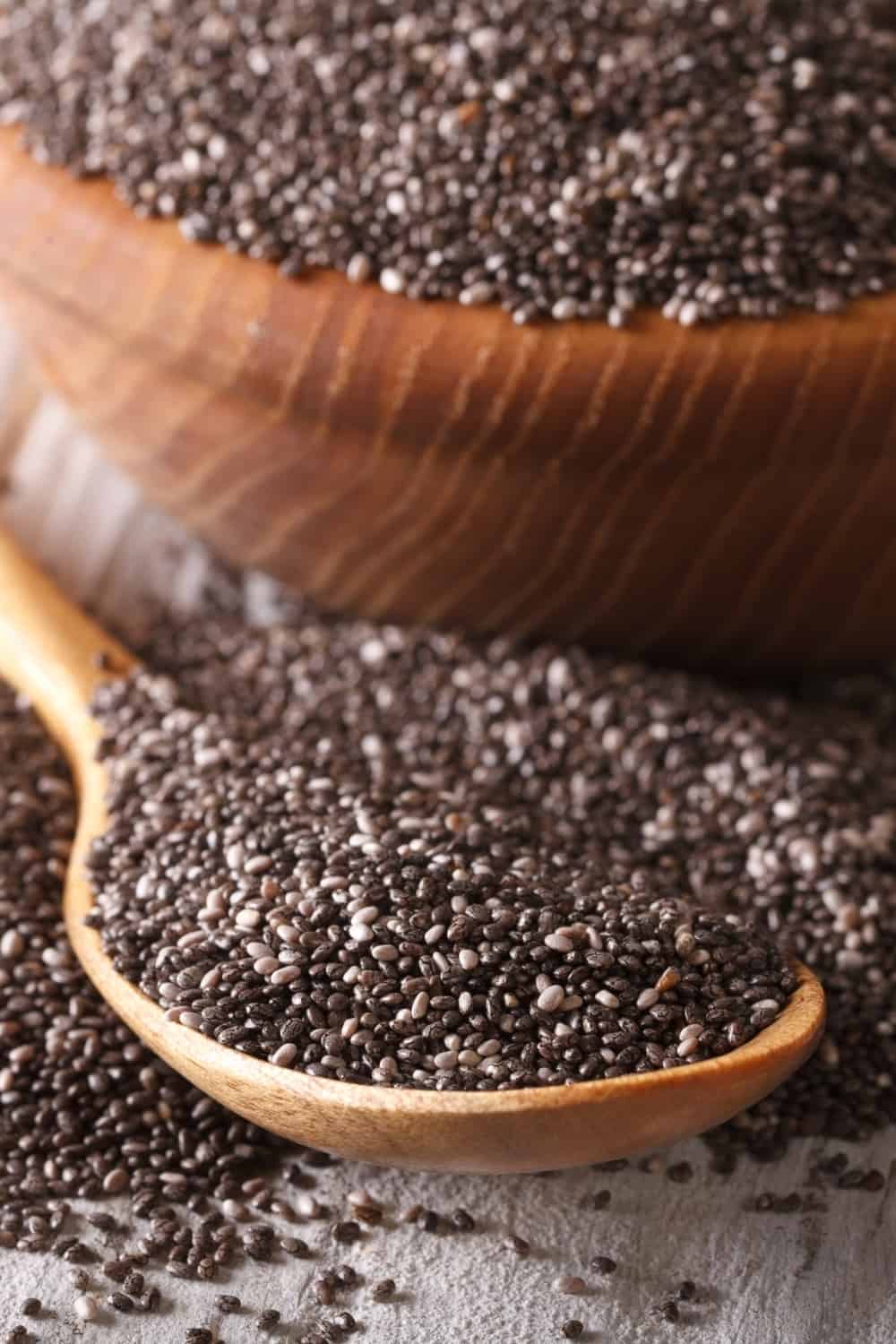
These versatile seeds come from the plant Salvia hispanica L. Just like flaxseeds, chia seeds are also ‘legitimately’ referred to as a ‘superfood’.
DID YOU KNOW? In Mayan, chia means “strength” which is related to the large amounts of energy chia seeds provide.
Similarities
• Health benefits: The main health benefits of chia seeds are regulating blood sugar and blood pressure. Psyllium husk also helps stabilize blood sugar.
• Availability: Both chia seeds and psyllium husks can be found in grocery stores, online stores, and supermarkets.
Differences
• Texture: Chia seeds have a crunchy and dense texture, while psyllium husk has a coarse, fluffy texture.
• Flavor: Chia seeds have a mild and nutty flavor, whereas psyllium husk has a neutral flavor.
• Nutrients: Chia seeds have high levels of many minerals but they don’t contain that many vitamins. Manganese, phosphorus, copper, selenium, magnesium, iron, and calcium are the most prominent minerals found in chia seeds.
Psyllium is not a good source of vitamins and minerals but it contains higher amounts of fiber than chia seeds. Psyllium has 78g of fiber per 100g, whereas chia seeds have around 36g of fiber per 100g.
• Price: Chia seeds are cheaper than psyllium husk. The average price of chia seeds is $10 per pound, compared to 17$ per pound for psyllium husk.
How to use chia seeds
One of the most popular ways to use chia seeds is in smoothies. You can also use them with salad dressings, baked goods, or homemade protein bars and popsicles.
Chia drinks are also becoming more and more popular. Learn how to make delicious chia drinks for weight loss and curb hunger in the video below:
3. Xanthan gum
Xanthan gum is produced by the fermentation of sucrose and glucose, and it has many industrial uses.
Similarities
• Flavor: Xanthan gum and psyllium husk have a neutral flavor.
• Availability: Both xanthan gum and psyllium husk are widely available in grocery stores, online stores, and supermarkets.
• Nutrients: Neither xanthan gum nor psyllium husk are a good source of vitamins and minerals, but they both contain high amounts of fiber.
• Health benefits: Both xanthan gum and psyllium husk are used for stabilizing blood sugar and cholesterol. They are also used as a laxative.
Differences
• Texture: Raw xanthan gum has a powdery texture, and it becomes sticky and elastic when liquid is added to it. Psyllium husk has a coarse, fluffy texture.
• Price: The average price of xanthan gum is $25 per pound, compared to $17 per pound for psyllium husk.
How to use xanthan gum
Xanthan gum is used as an emulsifier, thickening agent, and stabilizer. It is mainly used in sauces, dressings, bakery products, meat and poultry products, beverages, dairy products, and others. Xanthan gum can be dispersed into hot or cold liquids.
See Also: 15 Best Xanthan Gum Substitutes For Your Ideal Baked Dish
4. Cornstarch
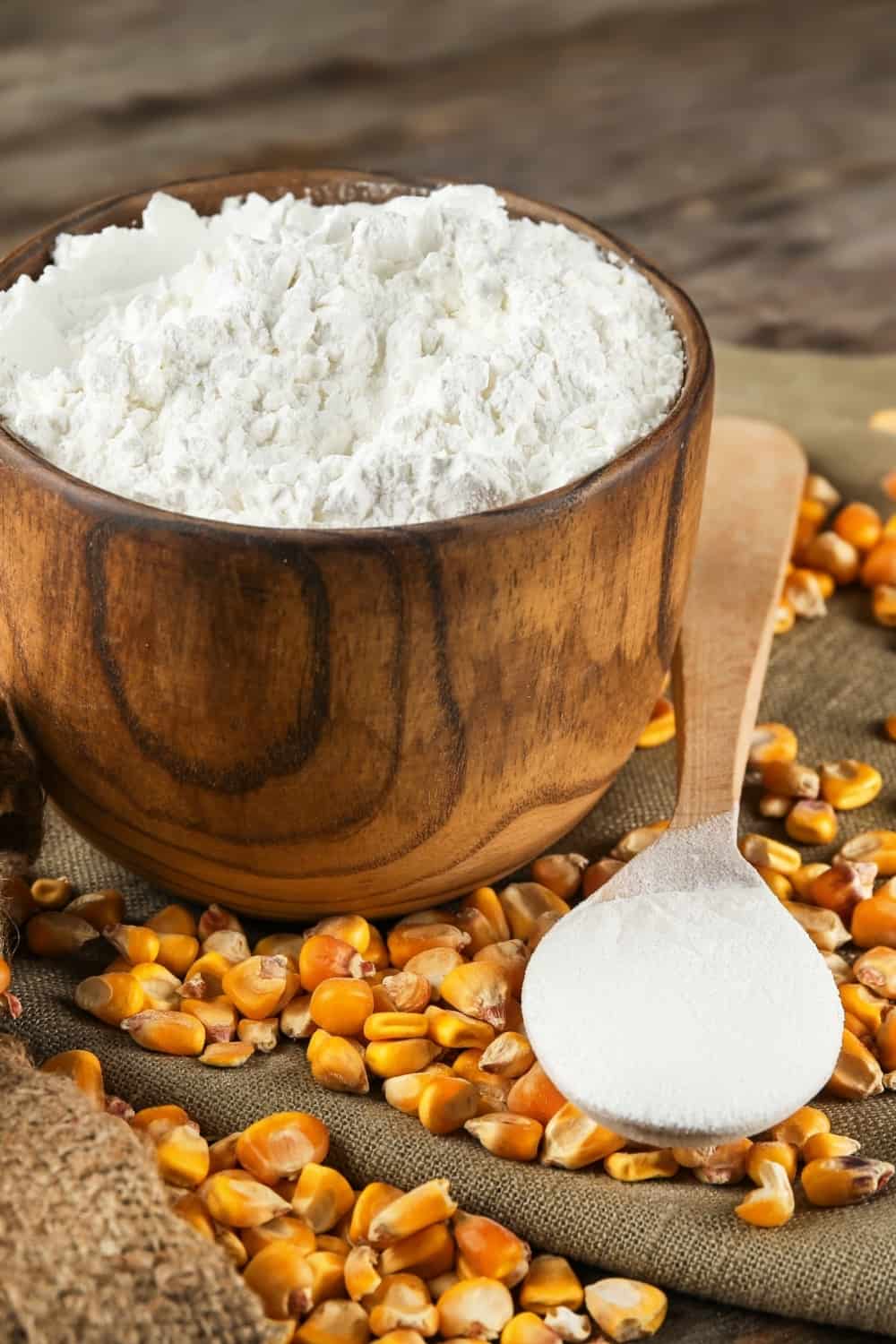
Corn starch, also known as cornflour or maize starch, is derived from corn grain. There are many reasons why people use cornstarch and one of them is to substitute psyllium husk.
Similarities
• Flavor: No, cornstarch doesn’t taste like corn. Surprise, surprise! Both cornstarch and psyllium husk have a neutral flavor.
• Availability: Both cornstarch and psyllium husk can be found in grocery stores, online stores, and supermarkets.
Differences
• Texture: Cornstarch has a silky and smooth, flour-like texture, whereas psyllium husk has a coarse, fluffy texture.
• Nutrients: Cornstarch is not rich in fiber, vitamins, or minerals. Contrary to it, psyllium husk contains significant amounts of fiber.
• Price: Cornstarch is a bit cheaper than psyllium husk. The average price of cornstarch is $15 per pound, while the average price of psyllium husk is $17 per pound.
• Health benefits: Cornstarch has no significant health benefits, while psyllium husk is primarily used as a laxative and it also helps stabilize blood sugar and cholesterol levels.
How to use cornstarch
Cornstarch is mainly used to thicken sauces, soups, gravies, and custards. It’s also used to make corn syrup and other sugars.
5. Tapioca starch
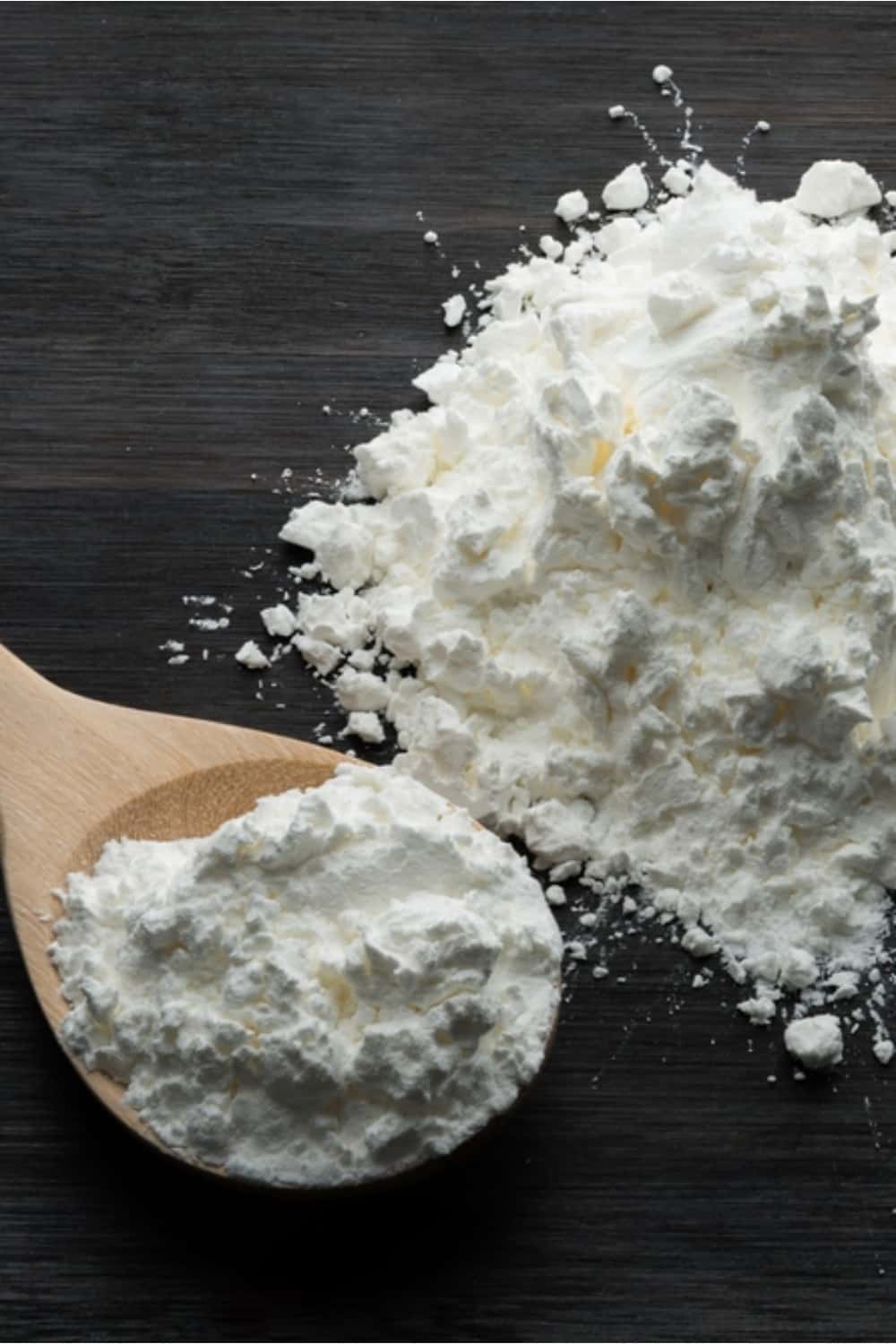
Tapioca is extracted from the storage roots of the cassava plant.
• Flavor: Tapioca starch and psyllium husk share a neutral flavor.
• Availability: Both tapioca starch and psyllium husk are widely available in grocery stores, online stores, and supermarkets.
• Health benefits: Both tapioca starch and psyllium husk help lower insulin levels and are great for digestive issues.
Differences
• Texture: Raw tapioca starch has a powdery texture but when cooked it becomes sticky and elastic. Contrary to it, psyllium husk has a coarse, fluffy texture.
• Nutrients: Tapioca can be a good source of iron and calcium. However, it’s not a good source of other minerals and vitamins, including fiber. Contrary to it, psyllium husk contains significant amounts of fiber.
• Price: Tapioca starch is a bit cheaper than psyllium husk. The average price of tapioca starch is $15 per pound, while the average price of psyllium husk is $17 per pound.
How to use tapioca starch
Tapioca starch is popularly used to make tapioca pearls or tapioca pudding. This starch is also used to make boba (tapioca pearls) which are made of tapioca flour and sugar or sweeteners. Boba (tapioca pearls) are added to boba or bubble tea.
6. Arrowroot powder
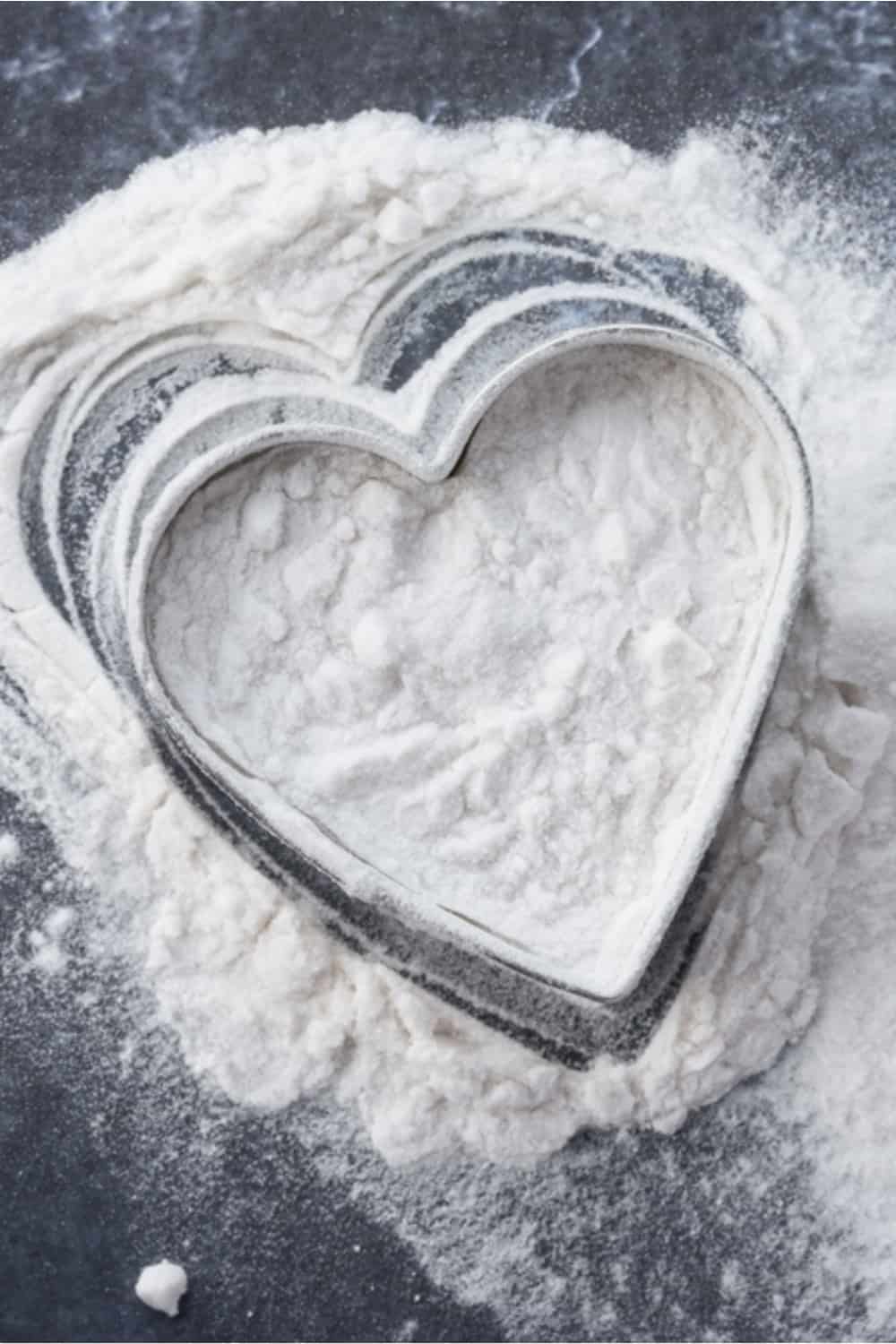
Arrowroot powder is a starchy substance obtained from the root of the tropical plant Maranta arundinacea.
Similarities
• Flavor: Arrowroot powder and psyllium husk share a neutral flavor.
• Price: The average price of both arrowroot powder and psyllium husk is $17 per pound.
• Availability: Both arrowroot powder and psyllium husk can be found in grocery stores, online stores, and supermarkets.
• Health benefits: Both arrowroot powder and psyllium husk help treat diarrhea.
Differences
• Texture: Arrowroot powder has a fine, silky, and powdery texture, whereas psyllium husk has a coarse, fluffy texture.
• Nutrients: Arrowroot powder has low amounts of fiber but is rich in calcium and potassium. It also contains low amounts of other vitamins and minerals such as magnesium and phosphorus. Psyllium husk has high amounts of fiber and low amounts of vitamins and minerals.
How to use arrowroot powder
Arrowroot powder is mainly used as a thickening agent for puddings, sauces, and jellies. It is also suitable for cookies and cakes. Arrowroot powder can be used as a substitute for wheat flour in gluten-free recipes.
7. Potato starch
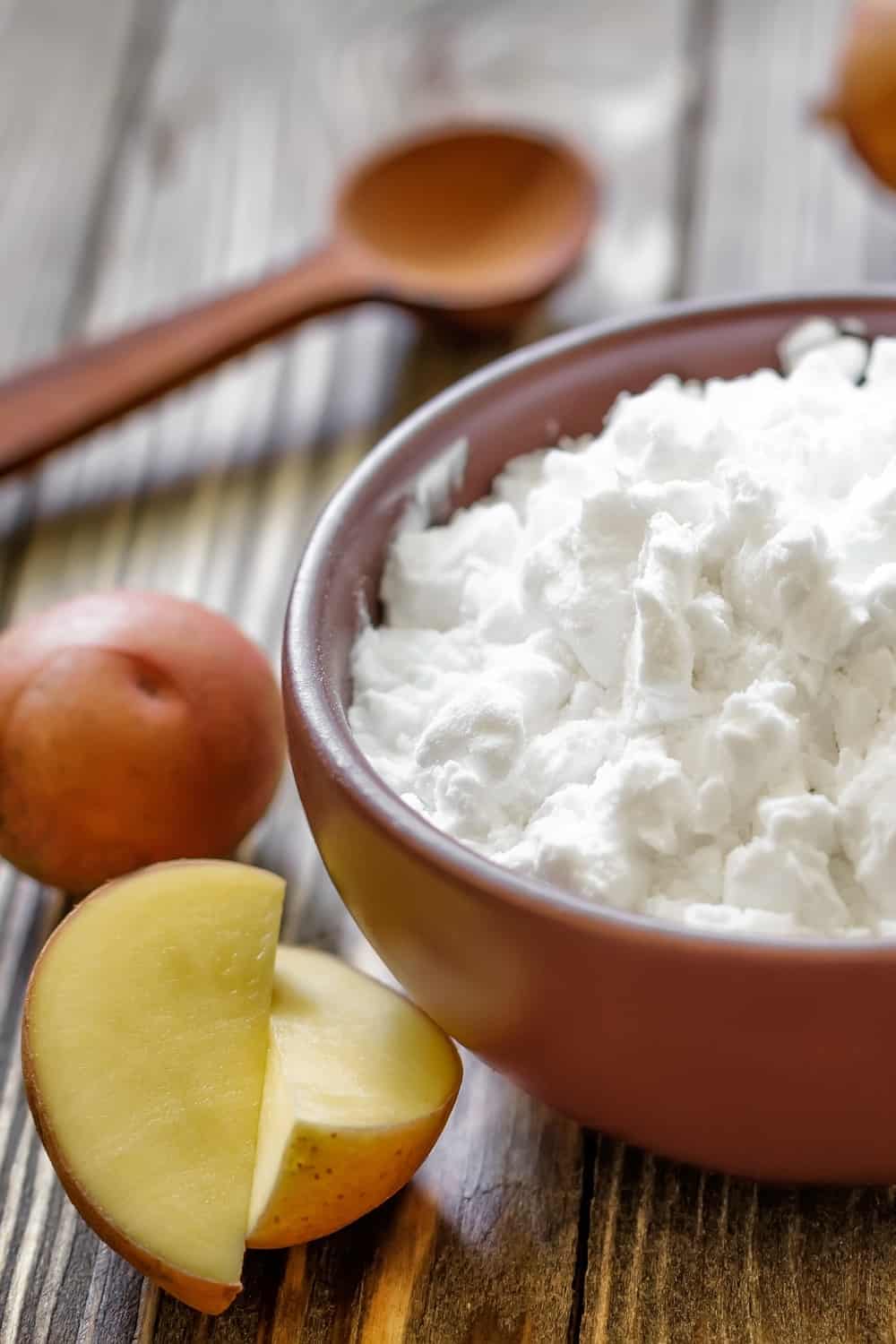
As the name implies, potato starch is starch obtained from potatoes.
Similarities
• Flavor: Both potato starch and psyllium husk have a bland (neutral) flavor.
• Availability: Potato starch and psyllium husk are widely available in grocery stores, online stores, and supermarkets.
• Health benefits: Both potato starch and psyllium husk help improve insulin sensitivity, and also help with constipation.
Differences
• Texture: Potato starch has a flour-like texture, while psyllium husk has a coarse, fluffy texture.
• Price: The average price of potato starch is $12 per pound, compared to $17 per pound for psyllium husk.
• Nutrients: Potato starch is 90% carbohydrate. It has low amounts of fiber, calcium, iron, and potassium. Contrary to it, psyllium husk contains high levels of fiber and low levels of vitamins and minerals.
How to use potato starch
Potato starch is used as a thickening agent in sauces, soups, gravies, pie fillings, casseroles, and stews. It can be used in baking recipes such as muffins, and bread. Potato starch is also popularly used for coating chicken, veggies, or fish before frying.
NOTE: Heat the potato starch slowly at a low temperature because extreme heat may cause potato starch to break down and lose its thickening properties.
8. Guar gum
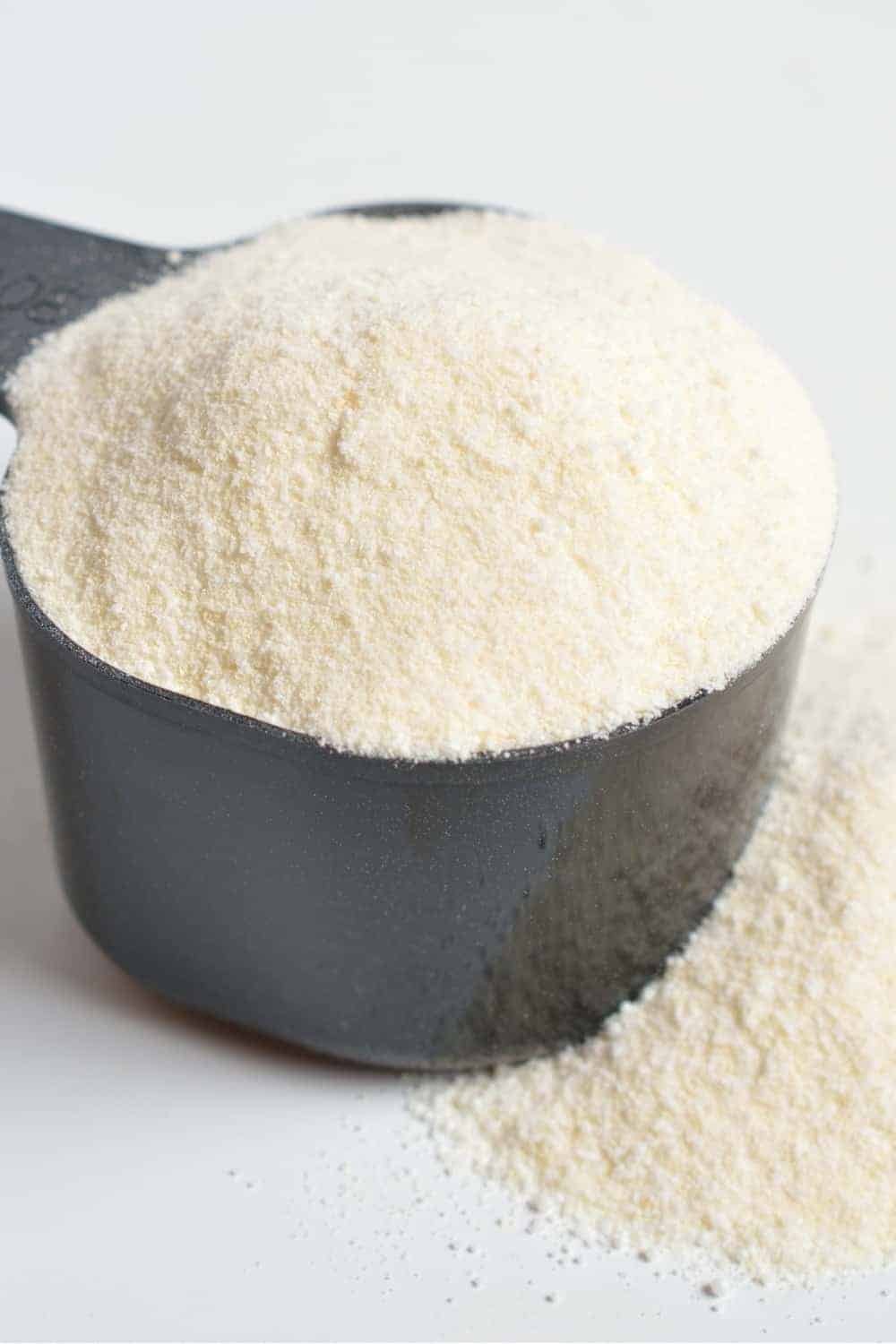
Guar gum is made from the seed of the plant Cyamopsis tetragonolobus native to Southeast Asia.
Similarities
• Flavor: Guar gum and psyllium husk have a neutral flavor (no smell or taste).
• Availability: Both guar gum and psyllium husk are widely available in grocery stores, online stores, and supermarkets.
• Nutrients: Guar gum and psyllium husk are good sources of fiber.
• Health benefits: Both guar gum and psyllium husk help support the digestive system, and help regulate cholesterol and sugar levels.
Differences
• Texture: Raw guar gum has a flour-like texture, and upon adding liquid it changes its texture to sticky and elastic. On the other hand, psyllium husk has a coarse, fluffy texture.
• Price: Guar gum is a bit more expensive than psyllium husk. The average price of guar gum is $20 per pound, while the average price of psyllium husk is $17 per pound.
How to use guar gum
Guar gum is used as a thickener in sauces, marinades, soups, stews, and dressings. It binds together ingredients in dairy products like ice cream and yogurt and it can also be added to almond milk or other types of milk.
Guar gum is a popular ingredient in homemade toothpaste, lotions, and conditioners because it helps form a smooth texture.
9. Almond flour
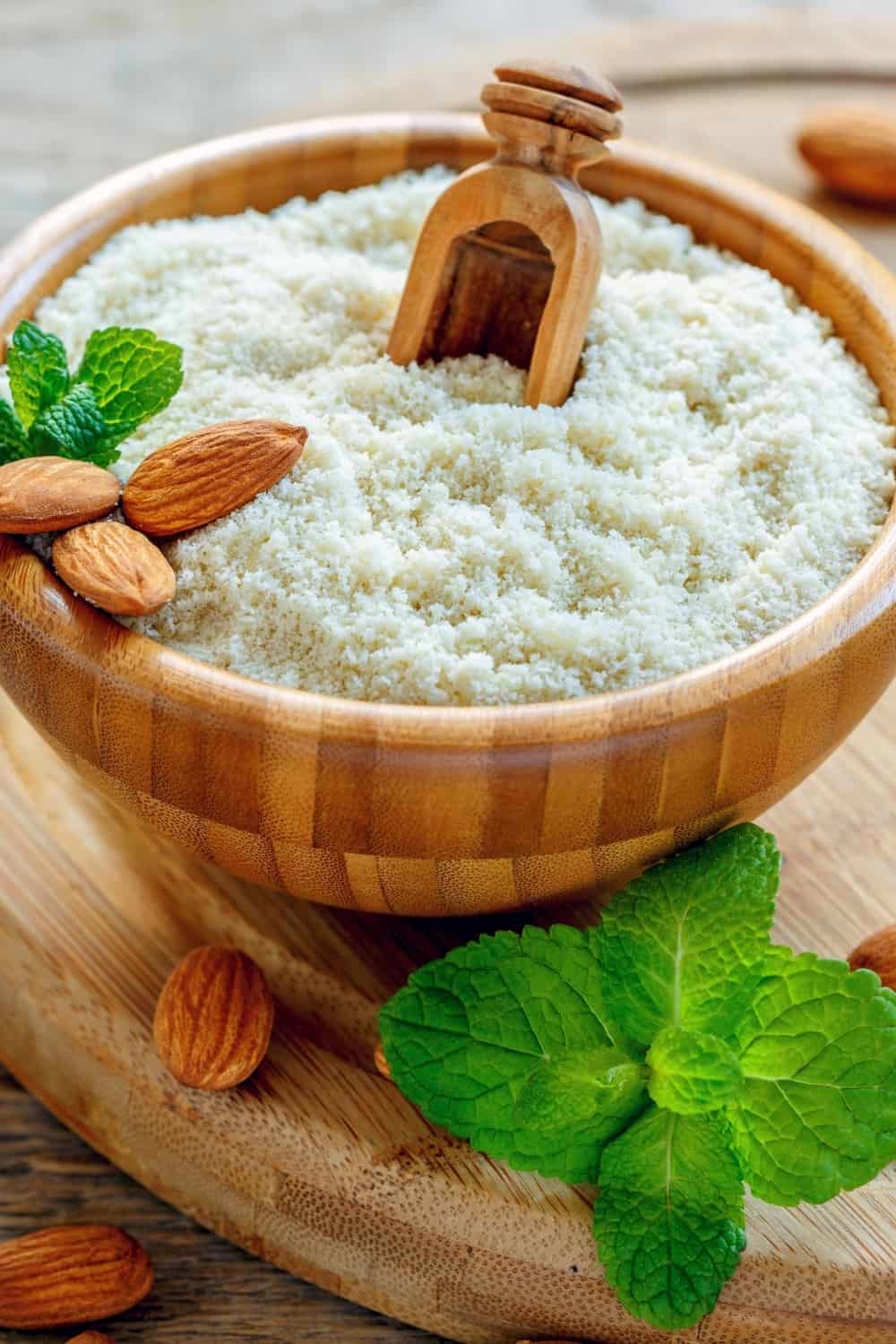
Almond flour is made from almonds that were blanched and peeled. Unlike all-purpose flour, almond flour is gluten-free, which is a huge advantage, especially for those people who have gluten intolerance or celiac disease.
Similarities
• Availability: Both almond flour and psyllium husk are widely available in grocery stores, online stores, and supermarkets.
• Health benefits: Both almond flour and psyllium husk help regulate cholesterol and blood sugar levels. Additionally, almond flour is an excellent energy booster because it contains lots of fat, vitamins, and minerals.
Differences
• Texture: Almond flour has a soft, powdery texture, while psyllium husk has a coarse, fluffy texture.
• Flavor: Almond flour has a mildly sweet, nutty flavor, while psyllium husk has a neutral flavor.
• Price: The average price of almond flour is $12 per pound, while the average price of psyllium husk is $17 per pound.
• Nutrients: Almond flour has lower amounts of fiber than psyllium husk. However, it contains more vitamins and minerals (vitamins B1, B6, magnesium, potassium, etc.) than psyllium husk.
How to use almond flour
Almond flour is popularly used in French macarons, quick bread, cookies, cupcakes, and cakes. Almond flour is also used for coating meats before frying. If you’re interested in learning how to make delicious almond flour tortillas, then check the video below:
10. Coconut flour
Its majesty, coconut flour, is made from dried coconut meat that is ground into flour.
Similarities
• Availability: Both coconut flour and psyllium husk can be found in grocery stores, online stores, and supermarkets.
• Health benefits: Coconut flour and psyllium husk help regulate blood sugar levels and they also help maintain healthy digestion.
Differences
• Texture: Coconut flour has a soft, flour-like texture, while psyllium husk has a coarse, fluffy texture.
• Flavor: Coconut flour has a mild, sweet coconut flavor, whereas psyllium husk has a neutral flavor.
• Price: Coconut flour is a bit cheaper than psyllium husk. The average price of coconut flour is $13 per pound, while the average price of psyllium husk is $17 per pound.
• Nutrients: Both coconut flour and psyllium husk have high amounts of fiber. Coconut flour has more vitamins and minerals than psyllium husk.
How to use
Coconut flour is popularly used in sweet cake recipes and it can also be used as a thickener in soups and stews.
Which Psyllium Husk Substitute Is Your Favorite?
The majority of psyllium husk substitutes are great for both digestive issues and as thickening agents in foods.
When I’m having digestive issues, I prefer using tapioca starch. When I want to thicken my soups or stews, I prefer using cornstarch.
I bet you also have your own preferences when it comes to psyllium husk substitutes, so feel free to share them with me. 😄
